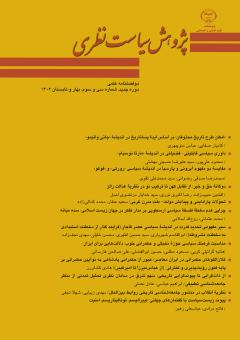مناسبت فرهنگ سیاسی حوزۀ نخبگی و حکمرانی خوب: دلالتهایی برای ایران
محورهای موضوعی : Research in Theoritical Politics
هانیه گرائیلی کرپی
1
,
مسعود مطلبی
2
,
حسین ابوالفضلی
3
,
علی صالحی فارسانی
4
![]()
1 - دانشجوی دکتری علوم سیاسی، واحد سمنان، دانشگاه آزاد اسلامی، سمنان
2 - استادیار گروه علوم سیاسی، واحد آزادشهر، دانشگاه آزاد اسلامی، آزادشهر
3 - استادیار گروه علوم سیاسی، واحد سمنان، دانشگاه آزاد اسلامی، سمنان
4 - استادیار گروه علوم سیاسی، واحد سمنان، دانشگاه آزاد اسلامی، سمنان
کلید واژه: فرهنگ سیاسی, حکمرانی خوب, دموکراسی, حوزه نخبگی و توسعه سیاسی. ,
چکیده مقاله :
حکمرانی خوب، فرآیندی است در جهت حاکمیت قانون، شفافیت، مسئولیتپذیري، مشارکت، برابري، کارایی، اثربخشی، پاسخگویی، آزادي فردي، آزادي مطبوعات و همچنین وجود یک جامعه مدنی فعال. ادبیات حکمرانی خوب تاحدودی با حکمرانی دموکراتیک و شاخصهای آن هم¬پوشانی دارد. هرچند این شاخصها در هر یک از جوامع به تناسب پیشینۀ تمدنی، تاریخی، فرهنگی و ساختار اجتماعی، جنبهای بومی به خود میگیرد و گاه در نهادینه شدن، تمایزاتی با جوامع دیگر دارند، یافتهها نشان میدهد که فرهنگ سیاسی نخبگان در صورت دموکراتیک بودن یا پذیرش حداقل ارزشهاي دموکراتیک، میتواند زمینه¬ساز پیشبرد دموکراسی یا توسعۀ سیاسی به مفهوم گسترش مشارکت و رقابت سیاسی باشد. اما در جوامعی که به دلایل مختلف و پیچیده، فرهنگ سیاسی نخبگان ضد مشارکتی به مفهوم غیر دموکراتیک است، در صورت وجود ساختارهاي سیاسی اقتدارگرا و یک ایدئولوژي همخوان با آن، میتواند مانعی جدي براي پیشرفت شاخصهاي دموکراتیک باشد. آنچنان که نظریه¬های گذار به دموکراسی نیز میگویند، هرچه ارزشها و ایستارهاي مشارکتی و دموکراتیک در فرهنگ سیاسی یک کشور بیشتر باشد، میتواند بر توسعۀ سیاسی آن اثرگذار باشد و بالعکس.
Good governance refers to achieving the rule of law, transparency, accountability, participation, equality, efficiency, effectiveness, accountability, individual freedom, press freedom, and active civil society. Along with these prerequisites, political culture, and in particular the political culture of the elites, is crucial in institutionalizing the principles of good governance, especially in developing countries. This subject has drawn the attention of certain good governance studies academics in recent decades. The results showed that if the political culture of the elites is democratic or accepts at least some minimal democratic values, it can act as the basis for advancing democracy or political development in the sense of raising political participation and competition. In societies where, for various and complex reasons, the political culture of the elites is anti-participatory in the sense of being anti-democratic, authoritarian political structures and an ideology consistent with it can pose a significant barrier to the advancement of democratic indicators. A political culture that is authoritarian and non-participatory acts as a factor that hinders political development. In contrast, democratic and participatory ideals and attitudes significantly influence a country's political development. This is more evident in emerging nations when elite political culture has a more robust coefficient of determination.
